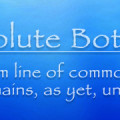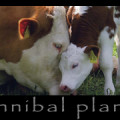An image above Herbivore’s table at the recent AR 2008 conference in Alexandria, Virginia, was a pin which read “There is no such thing as humane meat.” It’s something I wish the organizers of last year’s Taking Action for Animals conference had realized when they had a panel of ranchers who produced what I insist on calling less cruelly produced meat. And it brought to the forefront of my mind how language—and how people word things—can color one’s viewpoint.
I’m not unfamiliar with the concept. I’ve been a feminist all my life and have taken part in many pro-choice actions, so I know that how we refer to ourselves and to the other side frames the debate. And as a proud liberal, I know that conservatives are pretty good at controlling the language. Anyone who has spent the past seven years in George Orwell’s—I mean, Bush’s—America knows all too well that he and/or his speechwriters are very good at using language to obfuscate and confuse. They tricked the media into selling an immoral war and tricked (many of) the citizens into supporting it and convinced us to cheerfully let them eviscerate the Constitution in the name of security, much against Benjamin Franklin’s advice of over 200 years ago.
And animal abusers do it too and do it well. While those of us who are against consuming eggs call what is done to hens “debeaking,” the industry calls it “beak trimming,” something they compare to having one’s fingernails clipped, although it’s closer to having one’s schnozz lopped off. Hunters call what they do “culling,” implying that the deer (or wolf) population is just too large, and, they’re just here to help. Ranchers who don’t cram their animals into tiny spaces or feed hormones and antibiotics to their animals—those who treat their animals “well”—get to call their meat “humane,” although there’s nothing humane about killing an animal and tearing his or her body apart for someone’s meal. One thing we can do is try to get “less cruelly produced” into the lexicon so people realize that as long as they eat meat, they’re buying into cruelty, and there’s no escaping that. Repeat after me: It’s less cruelly produced meat.
It’s why I try not to refer to the places where these animals are kept as “farms,” but industrial facilities. If I have to use the word “farm,” I make sure the word “factory” gets well involved in the image. And why I am trying to shift away from “animal agriculture” to “animal industry,” although that can cover a lot of ground besides the exploitation of animals for food. After all, puppy mills are an industry, as are circuses and fur farms.
However, stripping away any pleasant imagery from the mass exploitation of animals that occurs on a staggering level—well over 90 percent of which is for food—is a necessity and a matter of language. You may have to explain to people the terminology for people unused to language stripped of euphemism, but people will hopefully catch on.
And while were at it, if someone describes himself with that idiotic term from a certain fast food commercial or calls herself a carnivore, it’s time for a smackdown of epic proportions.





2 Comments
Chia (324 comments)
September 23, 2008 at 5:24 pmI agree with you about the way language is used to frame a situation. Words are powerful tools. Thanks for an insightful article.
xetvx (26 comments)
September 28, 2008 at 6:47 amAs an English teacher I know all too well, the multifunctional abilities of words. However, I have noticed that in most cases where animal production is concerned; the problem lies not in the correctness of the language, but in the perception of those utilizing it.
This is why education is so important to me. People must be informed on all aspects of the animal industry or they will never be able to fully comprehend that less harsh words never lessen the pain of animals- at the mercy of their abusers.